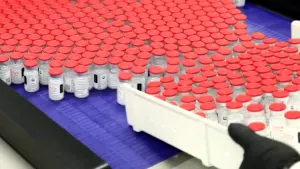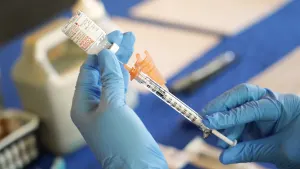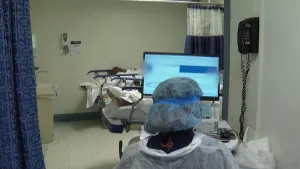The New Normal: Mental health and children
Depression, self-harm and suicide are on the rise among young people. What can you do to help your children?
•
May 11, 2022, 2:02 PM
•
Updated 1,093 days ago
Share:
More Stories

Nobel in medicine goes to 2 scientists whose work enabled creation of mRNA vaccines against COVID-19
584ds ago1:25

Pharmacies say they have not received orders for newest COVID booster
589ds ago0:21

Biden administration announces $600M to produce COVID tests and will reopen website to order them
596ds ago0:41

Gov. Hochul: Updated COVID-19 vaccine to be available in NY in the coming days
603ds ago2:13

NYSDOH: COVID numbers up with new variant accounting for 17% of new cases
637ds ago2:30

NYSHD: Hospitalizations caused by COVID increase by 22% in a week
645ds ago
Nobel in medicine goes to 2 scientists whose work enabled creation of mRNA vaccines against COVID-19
584ds ago1:25

Pharmacies say they have not received orders for newest COVID booster
589ds ago0:21

Biden administration announces $600M to produce COVID tests and will reopen website to order them
596ds ago0:41

Gov. Hochul: Updated COVID-19 vaccine to be available in NY in the coming days
603ds ago2:13

NYSDOH: COVID numbers up with new variant accounting for 17% of new cases
637ds ago2:30

NYSHD: Hospitalizations caused by COVID increase by 22% in a week
645ds agoDepression, self-harm and suicide are on the rise among young people. What can you do to help your children?
News 12's Elizabeth Hashagen was joined by Dr. Lata McGinn and Kelly Canzone to discuss mental health and our children.
New Jersey is one of five states where the number of suicides among adolescents between the ages of 10 and 19 increased during the pandemic.
Over two years into the pandemic, almost 2/3 of parents say it's had a negative impact on their child's education and over half say it's hurt their mental health.
Research shows that participation in college athletics decreases the likelihood of considering, planning or attempting suicide - but we've seen the anxiety, depression or other pressures become unbearable, and tragically another athlete died by suicide.
Last month, 20-year-old Lauren Bernett, a sophomore catcher and cleanup hitter for the James Madison University softball team, died. A medical examiner ruled the death a suicide. At least four other college athletes took their lives in March and April.
In 2019, 13% of adolescents reported having a major depressive episode, a 60% increase from 2007. Emergency room visits by children and adolescents in that period also rose sharply for anxiety, mood disorders and self-harm. And for people ages 10 to 24, suicide rates, stable from 2000 to 2007, leaped nearly 60% by 2018, according to the Centers for Disease Control and Prevention.
The crisis is often attributed to the rise of social media, but solid data on the issue is limited, the findings are nuanced and often contradictory and some adolescents appear to be more vulnerable than others to the effects of screen time. Federal research shows that teenagers as a group are also getting less sleep and exercise and spending less in-person time with friends — all crucial for healthy development — at a period in life when it is typical to test boundaries and explore one's identity. The combined result for some adolescents is a kind of cognitive implosion: anxiety, depression, compulsive behaviors, self-harm and even suicide.
When puberty hits, the brain becomes hypersensitive to social and hierarchical information, even as media flood it with opportunities to explore one's identity and gauge self-worth.
The falling age of puberty, has created a "widening gap" between incoming stimulation and what the young brain can process.
More from News 12
1:41

'You're Awesome.' Herricks HS honors late student's life with his signature greeting
1:45

Parents say unexpected closure of Ronkonkoma Tutor Time has them scrambling for new day care
2:03

South Country schools facing 51 position cuts in adopted budget heading to voters
0:40

Lawmakers approve bell-to-bell cellphone ban in schools starting in the fall
0:57

New York lawmakers agree on plan for 'bell-to-bell' school cellphone ban
1:31
